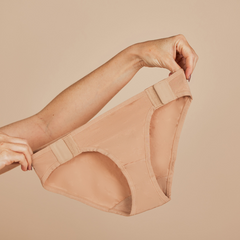
This blog post was written by pelvic floor physical therapist, Dr. Karla Wente, PT, DPT, WCS. She is the lead creator of The First Six Weeks, a revolutionary self-paced online course that guides you through each week of those first 6 weeks postpartum.
Care for those who give birth in the United States (US) is notoriously bad compared to other economically advantaged countries in the world. You may already know that the maternal mortality rate in the US is the worst compared to other countries, and the rates are worse for people of color, those with limited financial resources, and those with disabilities.
There are many contributing factors to our poor maternal care including our majority privatized healthcare system, inadequate supply of obstetricians and maternal care providers especially in rural areas of the country, systematic racism, and deficient postpartum care for birthing people. In fact, 50% of maternal deaths in the US occur in the postpartum period.
How long is postpartum care?
The American College of Obstetricians and Gynecologists (ACOG) reaffirmed their committee opinion in 2021 entitled “Optimizing Postpartum Care,” that encourages all people to receive ongoing care postpartum, with at least one medical visit occurring within the first 3 weeks postpartum.
Despite this recommendation, a recent systematic review of studies between 2015-2020 found that postpartum medical visit attendance ranges widely from 25% to 97%. ACOG states that around 40% of people do not receive a postpartum visit at all. Even when a postpartum visit does happen, the time of the provider is extremely constrained and therefore the needs of the birthing person may not be met.
We know that postpartum care is not happening as often or as well as it should.
Why is it important anyways to receive comprehensive and ongoing healthcare postpartum?
1. Reducing maternal mortality

There are real complications that can occur in the postpartum period that threaten the life of the mother. The majority of postpartum complications that contribute to maternal mortality include high blood pressure, infection, and bleeding/hemorrhage. Knowing what signs or symptoms that should signal you to call your medical team or get the emergency department is key.
Here’s a guide to when you might want to get to your medical team, regardless of whether you birthed vaginally or via c-section:
- Sudden warmth, swelling, redness of the scar or surrounding skin
- Fever (>100 degrees F)
- Oozing, drainage, pus from the wound
- Smell emitting from the wound
- Pain or tenderness after a few weeks of healing, or in one specific location of the scar.
- Incision splitting open in any way
- Hardness of the incision/scar
- Significant vaginal bleeding, vaginal or abdominal pain
When in doubt, call! If you have concerns, are unsure, or just don’t know if what you are experiencing is normal, call your OB provider. That is what they are there for!
2. Reducing maternal morbidity

While reducing deaths postpartum is certainly super important, it isn’t enough. Morbidity refers to medical complications, diseases, or illnesses and they can definitely happen postpartum.
Here are some of the most common morbidities that occur postpartum, and would warrant further intervention by your healthcare providers:
- Postpartum Depression. Hormonal, sleep, and role changes may contribute to feelings of sadness, anger, and frustration. However, if these persist, are severe, cause thoughts of suicide or harming others, or just generally concern you, call your medical team.
- Autoimmune Disease. Autoimmune conditions are most prevalent in females, and often can be triggered or diagnosed in pregnancy and postpartum because of hormonal and immune system changes.
- Musculoskeletal Pain or Injuries. Pregnancy places a big strain and change on a body, and this doesn’t magically change postpartum. There is a large incidence of low back pain, pelvic girdle pain (like pubic pain or SI joint pain), as well as foot, knee, shoulder, and hand pain problems that can occur postpartum. This is not normal and it is certainly not easy for a new parent who is moving a baby around. Should this happen, call your medical team and/or pelvic floor physical therapist to receive postpartum care to reduce suffering and pain.
- Pelvic Floor Disorders. Urine leakage, prolapse (a feeling of heaviness or sagging of the pelvic organs from the vagina or rectum), constipation, fecal leakage, and more can occur postpartum. These can be really common in the first few weeks postpartum, but should resolve. If they do not, or are severe and bothersome, seek out help from a specialized pelvic floor physical therapist experienced in treating those postpartum.
3. Help with recovery from a “typical” or “normal” pregnancy

As we mentioned above, pregnancy places a lot of strain on your body. Your posture may change, your feet may flatten, and your joints may be a bit more lax.
In medical care, after a long hospitalization, injury, or surgery you would typically receive rehabilitation through occupational and physical therapy to help you recover and return to your prior functional and fitness status.
In the USA, rehabilitation postpartum after delivery is not the norm, but it should be! Call your local physical or occupational therapist that specializes in postpartum care to help you rehabilitate postpartum.
In addition to physical changes, there are numerous changes to your roles, sleep, hormones, and more postpartum.
You are suddenly tasked with caring for a tiny, vulnerable human life that needs you for literally everything. That can be incredibly stressful emotionally, but also physically as you are picking up, putting down, and carrying your baby most of the day. Your sleep may be totally disrupted after delivery and with your new baby’s sleep schedule. Hormonally, things are shifting as well, and this may disrupt your mood, your sleep, and your physical function.
No one should go through the postpartum time alone or without support!
Additional options for early postpartum recovery don’t go it alone!
-
Schedule and keep your postpartum visit with your medical team (OB/GYN, nurse midwife), etc.
-
Schedule with a pelvic floor physical therapy specialist for 6 weeks postpartum, and ask to move it earlier if you have issues and need help sooner!
-
Check out The First Six Weeks, which is a revolutionary self-paced online postpartum course designed by specialists in holistic postpartum care to help guide people weekly through their first six weeks postpartum.



